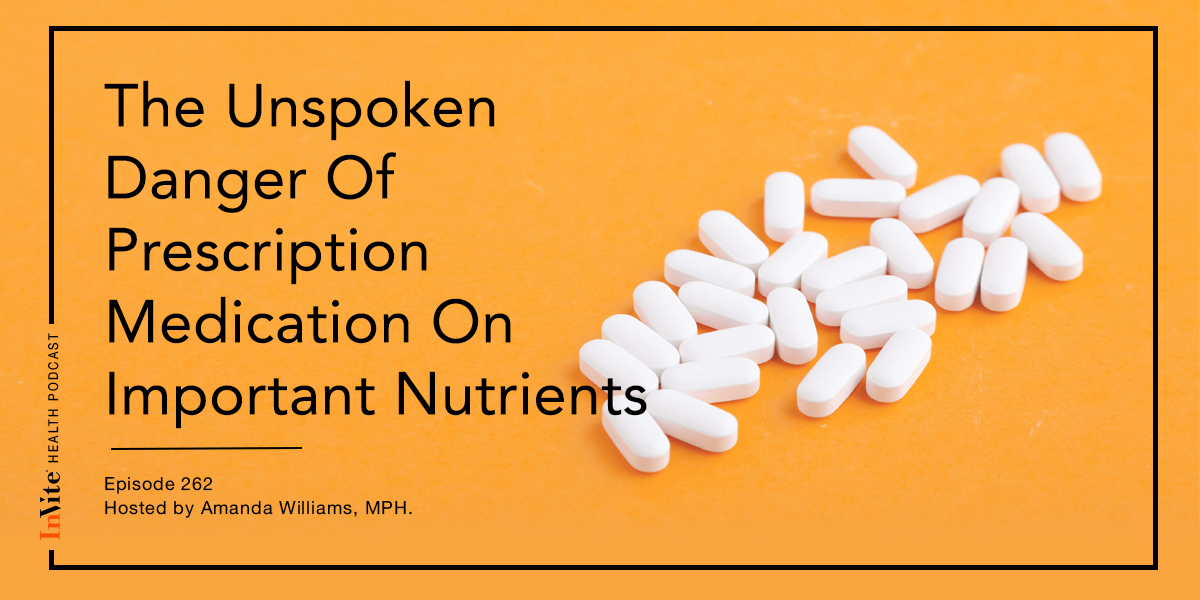The Unspoken Danger Of Prescription Medication On Important Nutrients – InVite Health Podcast, Episode 262

prescription
Invite Health Podcast, Episode hosted by Amanda Williams, MPH.
Subscribe Today!
Did you know that over 65% of the adults in the United States take a prescription medication? That is a very high number and out of that 65% that are on a prescription medication, many of those people are taking more than one. We’re talking about multiple medications and we certainly see this as people get older. In elderly people, for example, we will see that the median number of medications taken by adults over the age of 65 is four medications. It is not uncommon to see someone on 10, 12 or 15 medications per day, which is really quite scary.
The thing that I want to focus in on is what happens when someone is on these medications long term in terms of what is occurring biochemically in the body. Oftentimes, a prescribed medication is warranted and required, but we also have to take into consideration the potential for drug-induced nutrient depletion. This is so common. Quite interestingly enough, oftentimes doctors overlook this because their focus is never on nutrition, vitamins or minerals, but yet, often the medications that they’re prescribing to people are creating significant imbalances in key nutrients that the body requires in order to function properly. If we look and see that at least 65% of Americans are on at least one medication per day, what is the end result of that? I want to talk about this in detail.†
How We Lost Focus of Nutrition as the Keeper of Health – InVite Health Podcast, Episode 246. Listen Now >>
What do prescribed medications do to the body?
When it comes to prescription medications for blood pressure, for example, this is one of the most commonly prescribed classes of drugs in this country. While those prescription medications might be working to help regulate the blood pressure, at the same time, they could be creating another series of havoc in the body. I always encourage people who are on a prescribed medication or know someone else who is to please go to our website and look at our Drug-Induced Nutrient Depletion chart. It is a handy, useful guide and can really make such a difference.†
Click here to view our Drug-Induced Nutrient Depletion Chart Now!
I have talked to numerous people through the years who have been on a beta blocker such as atenolol or metoprolol for blood pressure. They had been on it for many years and seemed to think they weren’t having any problems with it, but when they started to delve into it a little bit more, they realized that maybe their energy wasn’t so good or they didn’t really sleep well. Interestingly enough, they may have been completely unaware of the fact that beta blocking drugs can create a deficiency in things such as coenzymeQ10, which is required for cellular energy production. These medications can lower the body’s melatonin levels, which can then be implicated in improper sleep. Those beta blockers can lower your chromium, which can then potentially have an impact on your blood glucose regulation.†
Do You Have A Nutrient Deficiency? – InVite Health Podcast, Episode 201. Listen Now >>
Many medications deplete critical nutrients, so we have to be aware of these potential deficiencies and we have to be proactive to that. This isn’t just related to people who are 60 and older who are on many medications. This can affect younger people, too. When you look at birth control medications or any type of hormone replacement someone may be on, you have to be aware that those synthetic estrogens and all of those other hormones, even the bioidentical hormones, can create significant depletions of many key nutrients in the body, including B vitamins, zinc, Vitamin C and magnesium. If you’re taking a hormone replacement or you’re taking something such as a birth control pill, you need to be aware of the fact that B6 levels are becoming depleted. B6 plays a very important role in over 130 different reactions in the body. A B6 deficiency can then drive up the potential for mood issues because it can create low serotonin. It can screw up your melatonin levels, which can then disrupt your sleep. This can potentially elevate your homocysteine levels, which means you have greater likelihood of vascular inflammation occurring. Low B6 in the body can also be associated with anxiety. These are all things that we need to know.†
Tune into the full podcast episode to learn more about the importance of recognizing drug-induced nutrient depletions.
Thank you for tuning in to the Invite Health Podcast. You can find all of our episodes for free wherever you listen to podcasts or by visiting www.invitehealth.com/podcast. Make sure you subscribe and leave us a review! Follow us on Facebook, Twitter and Instagram at Invite Health today. We’ll see you next time on another episode of the Invite Health Podcast.


